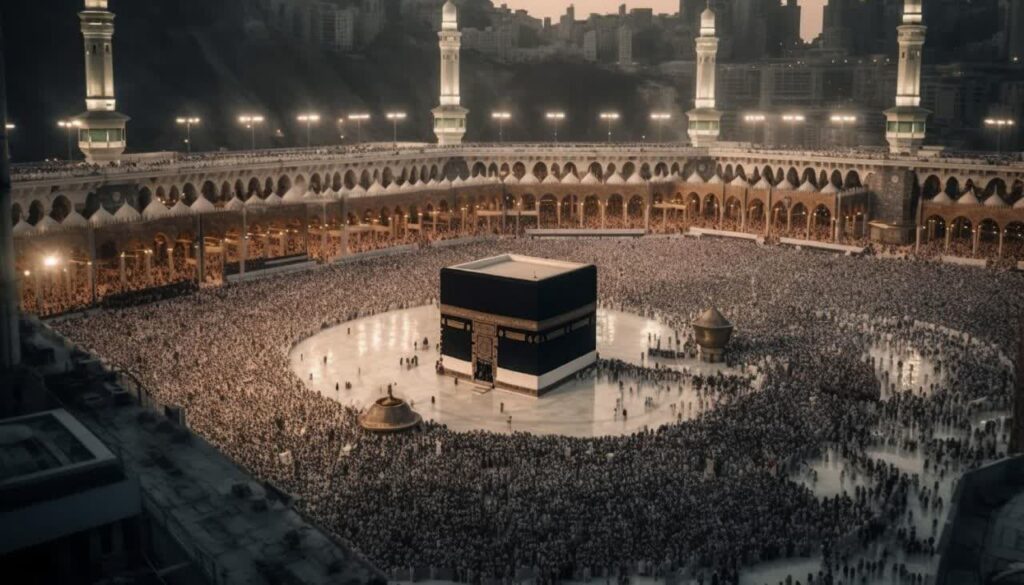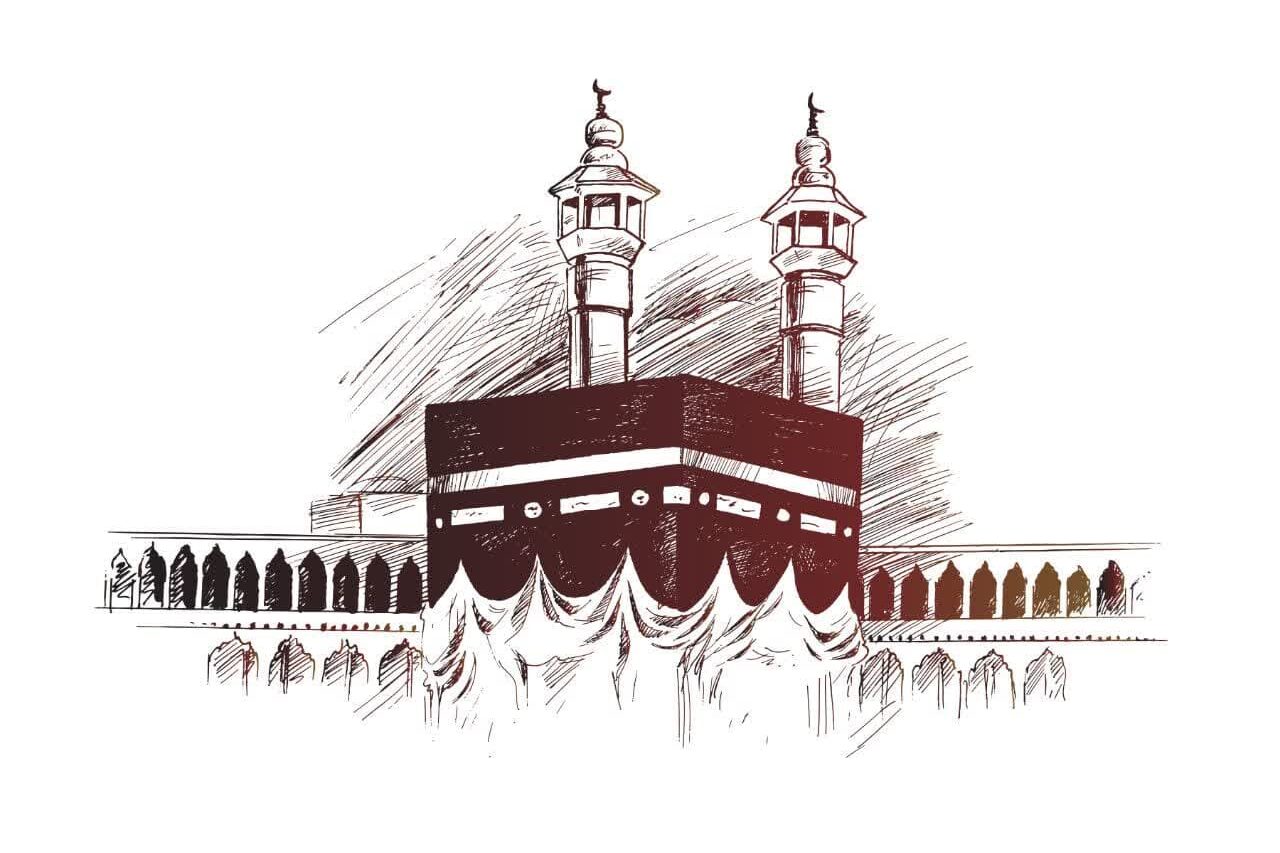History
The history of worshiping in Mecca traces back to ancient times, long before the advent of Islam. Mecca, nestled in the Arabian Peninsula, was already a sacred site for various Arabian tribes, housing the Kaaba, a cubic structure believed to have been built by the Prophet Ibrahim and his son Isma’il. The Kaaba served as a focal point for pre-Islamic Arabian polytheistic religions, where diverse communities engaged in pilgrimage and worship.
With the emergence of Islam in the 7th century, the Prophet Muhammad transformed Mecca into the spiritual center of the Islamic faith. The Kaaba, cleansed of its polytheistic associations, became the house of worship dedicated solely to Allah. The annual pilgrimage, Hajj, was established as one of the Five Pillars of Islam, drawing upon the ancient rituals associated with the Kaaba while instilling a new monotheistic purpose. The significance of Mecca as the holiest city in Islam was solidified during the lifetime of the Prophet Muhammad, as he and his followers faced challenges and persecution in their commitment to worshiping one God.
Over the centuries, Mecca has evolved into a global epicenter for Islamic worship, attracting millions of pilgrims annually from every corner of the world. The Grand Mosque, which surrounds the Kaaba, has undergone expansions and renovations, blending modern architecture with the historical significance of the sacred site. The rituals performed during Hajj and Umrah, including the Tawaf (circumambulation) of the Kaaba, Stoning of the Devil, and standing at the plain of Arafat, connect contemporary Muslims to the deep-rooted history of worshiping in Mecca, affirming their unity in faith and devotion to Allah.
Hajj
Hajj, the annual pilgrimage to Mecca, stands as one of the five pillars of Islam and holds profound significance for Muslims worldwide. This spiritual journey, obligatory for those who can afford it, encapsulates a message of unity, humility, and devotion to Allah. As millions of pilgrims embark on this sacred pilgrimage, the essence of Hajj goes beyond rituals; it resonates with the very core of Islamic teachings.
Unity in Diversity
Hajj serves as a powerful symbol of unity among Muslims, transcending geographical, cultural, and ethnic boundaries. Pilgrims from every corner of the globe, irrespective of their social or economic status, stand side by side, dressed in simple white garments, emphasizing the equality of all before Allah. This unity reflects the broader Islamic concept of the Ummah, the global community of believers bound together by their faith.

Spiritual Cleansing
The rituals of Hajj are a spiritual journey aimed at cleansing the soul and seeking forgiveness. Pilgrims engage in acts of worship, such as the Tawaf (circumambulation of the Kaaba), symbolic of the unity of the Muslim community around the central tenets of Islam. The ritual of Stoning the Devil signifies the rejection of evil temptations, promoting righteousness and moral purity.
Sacrifice and Submission
The act of sacrificing an animal during Hajj, in commemoration of Prophet Ibrahim’s devotion and obedience to Allah, underscores the importance of submission. It reinforces the idea that true faith involves surrendering to the will of Allah and being prepared to sacrifice for the greater good. This act of sacrifice extends beyond the ritual to encompass selflessness and compassion in daily life.
Equality and Brotherhood
The Ihram, the simple white attire worn by male pilgrims, symbolizes equality and humility. All pilgrims, regardless of their status or background, adopt the same attire, erasing distinctions of wealth and social standing. This collective state of simplicity emphasizes the fundamental principle of brotherhood in Islam, fostering a sense of shared humanity and equality.
Commemoration of Prophetic Legacy
Hajj retraces the steps of Prophet Ibrahim and his family, preserving the legacy of devotion and resilience. The rituals also commemorate the struggles of Hagar, Ibrahim’s wife, and their son, Prophet Isma’il, exemplifying the strength that arises from unwavering faith in Allah.
Global Solidarity
Hajj serves as a powerful demonstration of global Islamic solidarity. Muslims, irrespective of their diverse backgrounds and languages, come together to worship and seek forgiveness. The collective prayers and supplications during Hajj convey a message of peace, unity, and shared responsibility for the welfare of the entire Muslim community.
Hardships in Hajj
Participating in the Hajj pilgrimage is a significant financial and emotional commitment for Muslims. The monetary cost of Hajj can vary based on factors such as travel arrangements, accommodations, and the country of origin. Pilgrims often spend a considerable amount on visa fees, transportation, lodging, and the purchase of necessities for the pilgrimage. The expenses can be substantial, and for many, saving for years is necessary to afford this sacred journey.
Beyond the financial aspect, the hardships associated with Hajj are intrinsic to the pilgrimage experience. Pilgrims undergo physical challenges, including long walks, exposure to extreme weather conditions, and crowded spaces during rituals like the Stoning of the Devil and the Tawaf around the Kaaba. The mental and emotional strains arise from the intense spiritual nature of the pilgrimage, the vast number of participants, and the need for patience and perseverance in the face of logistical challenges.
Despite the financial investment and hardships, Muslims view the Hajj pilgrimage as a once-in-a-lifetime opportunity, a fulfillment of a religious duty, and a deeply spiritual journey. The sacrifices made, both in terms of money and enduring challenges, are considered a testament to the pilgrim’s dedication to their faith and submission to the will of Allah. The collective experience of millions undertaking the pilgrimage reinforces the sense of unity and shared purpose among Muslims worldwide.
Conclusion
Hajj is more than a physical journey; it is a spiritual odyssey that reinforces the core values of Islam. The pilgrimage encapsulates the principles of unity, equality, sacrifice, and devotion to Allah. As pilgrims undertake the rituals, they carry back with them a renewed sense of spiritual purpose and a commitment to embody the teachings of Hajj in their daily lives. The message of unity and shared humanity, emanating from the heart of Islam, resonates far beyond the sacred grounds of Mecca, influencing the broader fabric of the Muslim Ummah and contributing to the vision of a harmonious and compassionate world.

